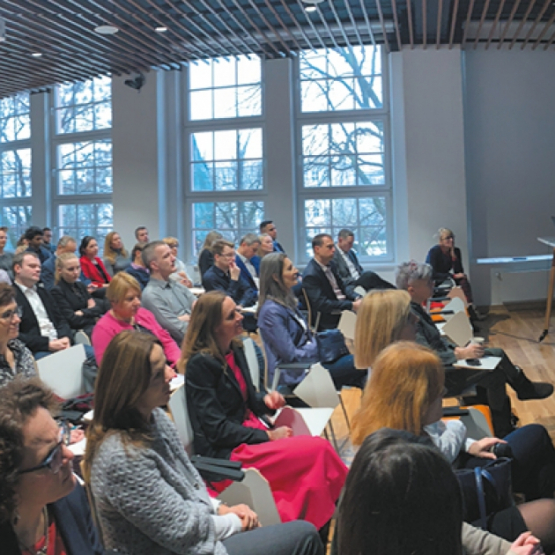
In today’s world, there are countless career options, offering unique opportunities, but also posing specific challenges. It is crucial to understand one’s passions, skills, and values in order to consciously choose the right path.
Whether opting for a classic corporate track, venturing into entrepreneurship, pursuing an academic career, or leading innovative interdisciplinary projects, it’s worthwhile to follow dreams and realize professional aspirations. After all, a career is not just a means of earning money; it’s also a journey that shapes our lives and sometimes even impacts entire societies.
In an era where creativity, flexibility, adaptability, and agility have become practically obligatory, advancing in one’s professional career is increasingly challenging, and urges us to explore various paths. Interviews with our graduates, who talk about their choices, show how diverse can be routes one can take towards success and self-realization. Analysing their career paths reveals several areas in which they thrive: the corporate sector, public sector, entrepreneurship, and academic career. Let’s briefly look at some examples.1
CLASSIC TRACKS: BANKS AND CORPORATIONS
SGH graduates often align themselves with traditional organizational structures such as banks, corporations, or large institutions, which remain the foundation of many careers. Individuals choosing this path typically gain experience and skills necessary for managing complex business operations. However, contemporary banking is not just about stability; it also involves developing skills essential for financial management at various levels, also in novel areas like fintech. Careers in banking and corporations can lead to top management positions, offering diverse development opportunities in roles related not only to finance but also to human capital, marketing, or business strategy. This is evidenced by the career paths of winners of the “SGH Leader”2 alumni title, which include individuals like Wiktoria Brauksiepe – CFO, Board Member, North East Cluster, Henkel (2023 laureate), and Agnieszka Gajewska – Partner@PwC, Global Government & Public Services Leader, CEE Clients&Markets Leader, Dorota Zimnoch – currently Global Industry Advisor, FSI, Microsoft, and Gosia Karaś – Investment Director at SoftBank Investment Advisers (2022 laureates). How to get to the top?

BRUNON BARTKIEWICZ, President of the Management Board of ING Bank Śląski S.A., reveals his recipe for success, stating that “success comes from diligent and thorough execution of a well-designed business model.” He also emphasizes how important it is to like people, as it forms the basis for building necessary business relationships. According to him, “. . . everyone is the architect of their own destiny. If someone has natural predispositions to be a leader, and they have support from individuals around them, there’s a good chance for success.” This applies not only in business, so it’s essential to remember this and seek support whenever its needed.
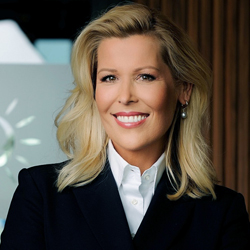
DAGMARA BRZEZIŃSKA, Vice President of InPost, a logistics operator, considers self-discipline a prerequisite for success. She believes that “. . . self-discipline is linked to the ability to plan. If there’s no specific goal or vision, it’s very easy to succumb to temporary opportunities that divert us from our planned goal. True, by taking advantage of these opportunities, we learn new things and acquire skills, but we move away from our main objective. Therefore, we should calibrate that goal from time to time.” Our graduate emphasizes that “. . . courage to pursue one’s own path and sometimes make decisions that are not obvious” is also an important trait. In her opinion, “awareness of one’s characteristics is also a very important success factor.” Finally, but no less importantly, Dagmara Brzezińska identifies “self-improvement, striving for continuous development, and drawing conclusions from failures” as crucial. “These are important qualities of people who want to succeed,” she emphasizes.
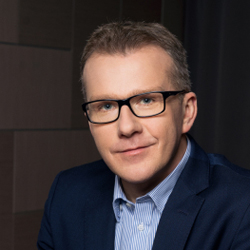
“I believe that the key competence is the ability to plan,” says SŁAWOMIR GRZELCZAK, President of BIG Infomonitor and Vice President of BIK, asked about the recipe for success. He adds that competencies required to achieve success include good work organization and a propensity for risk-taking in the face of new challenges or changes. “Today, in highly variable and uncertain environment, this is a very necessary and expected competence. Also, continuous development and further education are obviously essential for achieving success. It must not be forgotten that those who want to succeed must also know how to lose,” he adds.
PUBLIC SECTOR AND BUSINESS ENVIRONMENT INSTITUTIONS
In the case of large institutions such as government agencies or non-profit organizations, it is possible to engage in projects of significant social importance. One particular type of public activity is politics. What determines success in this area?
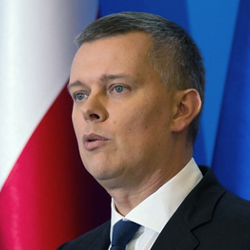
According to TOMASZ SIEMONIAK, former Deputy Prime Minister in the government of Ewa Kopacz and Minister of National Defence in the government of Donald Tusk, currently a member of parliament and deputy chairman of the Civic Platform party, “the most important thing seems is to always be yourself, to be authentic. Voters feel and know that if someone is authentic, they are also credible. If someone pretends to be someone else, it usually ends badly.” According to Minister Siemoniak, “if someone really wants to engage in politics, they must be well-versed a something field.” It is also important to be active, to engage, not necessarily in a party youth organization or a strictly political organization. There are many opportunities at university or in the tertiary sector, non-governmental organizations, e.g. volunteering. It is also worthwhile to cooperate with politicians or local government officials, for example through internships, and thereby be noticed and appreciated. It would be good to learn rhetoric – it will pay off in the future. The rest is work, luck, and the ability to persuade others of your views, ideas, and plans. The relevance of these guidelines makes them universal and applicable in all areas of professional activity.
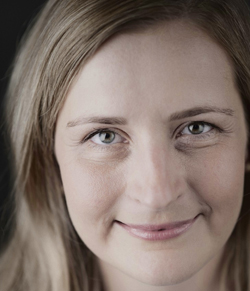
And how should one plan their career when considering a path as a European Union official? Our next graduate, MAŁGORZATA PITALA, who works in the Directorate-General of the European Commission for Internal Market, Industry, Entrepreneurship, and SMEs, provides important guidance. “Abilities and soft skills, as well as networking skills, are very important. Additionally, what counts is acceptance and understanding of diversity, tolerance, ability to find common ground, respectful approach to opponents, even if we disagree with them, and proficiency in foreign languages,” points out the EU official.
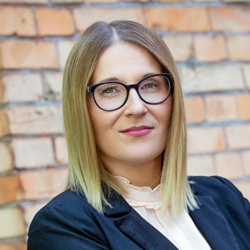
AGNIESZKA WACHNICKA, Vice President of the Polish Banks Association, also notes that “SGH is a university that teaches independence, but also enables focus on areas that are truly interesting to us, for example through individual choice of study paths. This facilitates entry into the business world.” SGH also offers “flexible choice of subjects and lecturers and provides extensive contact with market practitioners, which is crucial because the ability to apply knowledge in practice determines readiness for career development,” she argues.
ENTREPRENEURIAL PURSUITS: FOUNDERS OF COMPANIES AND START-UPS
Those seeking more dynamic challenges can opt for the entrepreneurial path. Start-ups offer flexibility, creativity, and the opportunity to shape one’s own career. However, there’s always a risk of failure, so entrepreneurs have to be not only be resourceful, but also mentally resilient. Risk is a driving force, and success brings both challenges and significant rewards, but often it also relies on the ability to cope with uncertainty and to quickly adapt to changing market conditions. Among the bold individuals who have succeeded, we find those honoured on the Forbes 30 under 30 list, young people who have revolutionized their fields before the age of thirty. Over the past three years, 17 SGH graduates have been included in this group; two of them twice.
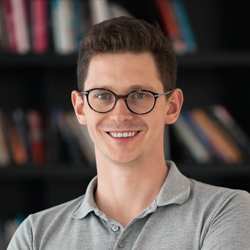
Entrepreneurship is a difficult and demanding career path. Not everyone can or should become an entrepreneur, but “everyone should try their hand at their own business for at least a moment,” because only in this way can they find out if it is the right path for them. DAMIAN STRZELCZYK, co-founder of the Tutlo online English language school, talks about traits necessary for pursuing an own-business path: “Supporting traits include curiosity, inquisitiveness, problem-solving skills, and courage to question reality. People who want to start their own business should also seek solutions to problems in their immediate environment. Proactive thinking or considering how to do something differently can lead to interesting business concepts. Other traits include responsibility for one’s life and decisions we make, a belief that everything depends on you and that you can influence things. It’s also about consequences, which, although not very effective in the short term, will lead you to your goal. And of course, taking initiative, without fear of standing out or leaving our comfort zone,” he says.
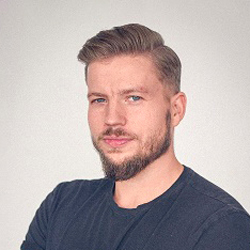
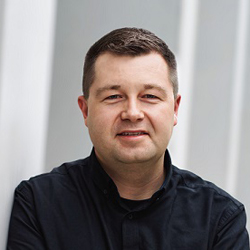
MICHAŁ PIOSIK AND PIOTR GRABOWSKI, founders of the Foodtech accelerator, rightly observe that “there is no single path to success or a single career path for life. The most valuable quality when it comes to running your own business is resourcefulness.” They also suggest that relationships from university are absolutely crucial for achieving business success. “We can’t imagine how our first, second, or third business would have turned out if it weren’t for the wide network from our university days,” they say. This demonstrates how important university friendships and relationships university are.
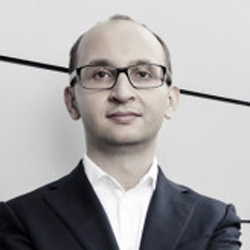
According to BARTŁOMIEJ OWCZAREK, co-founder of the website GdziePoLek, “the most important thing is the desire to build, not to learn, because people who build something, at the same time learn what is necessary for them. They choose their own tools, and if needed, find a tutorial on YouTube to educate themselves. This distinguishes people who start companies from those who see themselves as employees in the job market. Another factor, indirectly helpful in achieving success is also direct contact with the customer, the real market, the community, because this way we will learn about needs and will be able to create a business idea that meets those needs,” notes Bartłomiej Owczarek. He emphasizes the importance of action.
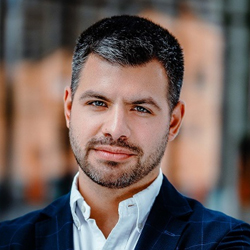
“Seizing opportunities as they arise” is the key to success, according to MATEUSZ CZECH, COO of the Nethone technology start-up. “Only the combination of two skill types – technical and soft ones, increases the chance of success in your own business,” he points out.
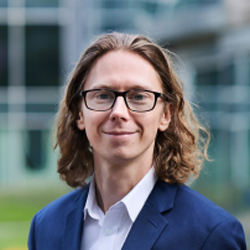
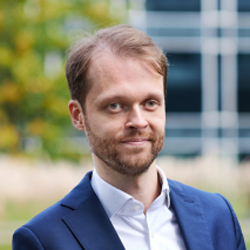
ROBERT FLORCZYKOWSKI AND ANDRZEJ BERNATOWICZ, co-founders of the proprietary Third Dot technology fund, note that “development is associated with stepping out of our comfort zone. After working for several years in a corporation and achieving good results, you enter a comfort zone. Opening something of your own is a way to leave this zone, and consequently to develop. You have to find yourself in a place where everything needs to be built from scratch again.” An entrepreneur must therefore be ready for new challenges, for possible failure. The entrepreneurial path is not for everyone.
SCIENTIFIC EXPLORATIONS: INTERNATIONAL PATHS IN ACADEMIC CAREERS
International academic careers enable collaboration with outstanding minds from various backgrounds and cultures, contributing to global exchange of knowledge. Examples of such careers include work at renowned universities or research institutes, as well as participation in international projects. Scientists often shape the world by their research. Their articles can familiarize us with challenges connected with work at universities or research institutes, as well as recount successes achieved in an international context. This is a path chosen by individuals driven by a passion for discovery and knowledge, as this career path is fascinating, but also demanding.
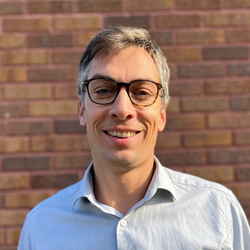
Among the successful graduates who pursue this path are Andrzej Skrzypacz, professor of economics, Theodore J. Kreps at the Stanford Graduate School of Business, and Marcin Kacperczyk, professor of finance at the Imperial College Business School.3 TOMASZ OBŁÓJ, a lecturer at HEC Paris, emphasizes that in science today most important are “hard skills – understanding data, and soft skills – emotional intelligence and recognizing one’s decision-making models.”
LESS TRAVELLED PATHS
Sometimes career choices are not as obvious as those typically associated with graduates of economic universities. However, SGH creates conditions to explore unorthodox paths, as mentioned by the graduates themselves.

KAROL GÓRNOWICZ, the CEO of Skriware, a company operating in the field of EdTech, believes that “SGH provides excellent conditions for developing interdisciplinary business skills through involvement in student organizations . . ., it nurtures imagination and fosters courage, especially in the context of creating one’s own reality.” Let us also note that SGH “also shapes leadership attitudes, often referred to as soft skills, but they are of great importance in life.”
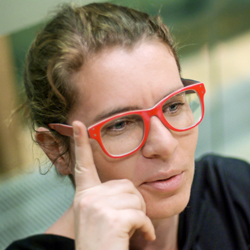
AGNIESZKA LICHNEROWICZ, a journalist for TOK FM radio, emphasizes both the freedom of shaping the study path at SGH and the possibility of choosing subjects and lecturers themselves: “Studying at SGH gave me the opportunity to seek and shape my own path of intellectual development. I was also amazed by the culture of student involvement in various initiatives, projects, or organizations. It gave me the opportunity for mutual understanding and lively discussion based on arguments.” The journalist successfully uses these skills during her programmes on TOK FM radio.
In the current competitive professional environment, graduating from a prestigious university becomes an important element in building a successful career. However, it is not only acquiring knowledge and skills at the highest level that determines later success, but also relationships established during studies. Collaboration with talented colleagues and professors, exchange of experiences, and building networks open doors to interesting professional opportunities. A prestigious university not only guarantees high educational standards, but is also a key to building relationships that can significantly influence further professional development. All our graduates emphasize that the study period was a time of making acquaintances and friendships, also within numerous student organizations at SGH. As part of student projects, you can travel to many countries, and membership in student scientific circles is completely voluntary. Student organizations at our university are full of students who want to acquire specific skills or competencies, carrying out numerous projects that often require considerable commitment.
“Studies are also a time of pleasure, joy in life, which will not happen again, so young people should take advantage of it. Work, career, or building a business are important and interesting, but at least part of university time should be devoted to making memories and building friendships that will last long after leaving the university walls,” says Mateusz Czech.
That is why we talk about the SGH family, which brings together all graduates, students, and employees. Being part of this community is not only prestige and a source of pride but also a significant commitment to solidarity and sensitivity towards all its members. Our values: truth, honesty, respect, cooperation, and professionalism, are the foundation on which the entire SGH community can build a great, modern “edifice” of their careers.
RENATA KRYSIAK-ROGOWSKA, SGH Career and Alumni Centre
JUSTYNA KOZERA, Director of SGH Career and Alumni Centre
- More about graduates can be found at https://alumni-stories.sgh.waw.pl. You can read the interviews quoted here in full version on the Gazeta SGH website in the Alumni section.
- More information about the competition can be found on the website https://alumni-leaders.sgh.waw.pl
- Both are laureates of the “SGH Leader” alumni competition.


